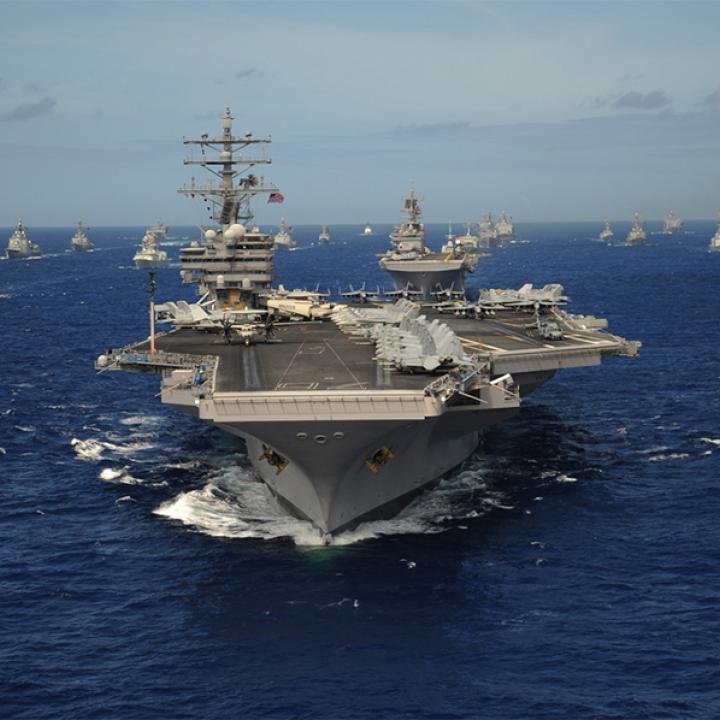

Although a military response to Syria's August 21 chemical weapons attack is on hold, Washington can restore credibility and pressure by threatening to strike immediately if the Assad regime uses such weapons again.
On September 10, President Obama forcefully made the case for a targeted military strike on Syria in a nationally televised speech. Yet with increased opposition at home and a proposed Russian plan to secure and dismantle all Syrian chemical weapons (CW), such a strike seems doubtful in the short term. To keep the pressure on in the meantime, Washington should consider announcing that any new CW use would be met with immediate U.S. military action under the president's constitutional authority.
REESTABLISHING CREDIBILITY
As the United States tries to negotiate a UN Security Council resolution on Syria, the threat of force must remain on the table. Indeed, it was the prospect of an American military operation -- however vague -- that spurred Moscow and Damascus to present their latest diplomatic proposal. A viable deal is therefore unlikely unless the Obama administration remains firm in its commitment to use force if necessary.
Yet the delayed response to the Assad regime's August 21 CW attack, the decision to appeal to Congress, and the widespread domestic resistance to U.S. involvement in Syria all call into question the president's willingness and ability to act. This perceived inaction has also harmed American credibility abroad, which is vital to dealing with numerous regional issues, most importantly Iran. The United States may not be the world's policeman, but its decisions on whether or not to engage globally have broad repercussions and are essential to preserving American interests and international stability.
Thus far, the administration has not displayed great strategic acumen in dealing with the Syria war or the CW issue. U.S. policy has largely been off-the-cuff (as with the original CW "redline") or made in private (the decision to seek congressional approval). But that is water over the dam. Going forward, the administration can restore credibility by focusing on the "least bad" political outcome in Syria, showing leadership, and exercising message discipline.
A FIRM NEW REDLINE
As the president discusses the CW proposal with Moscow and other parties, he should make clear that while a military response to the August 21 attack is on hold, the United States will strike immediately if the Assad regime uses CW again. This warning should be detailed and firm: if that line is crossed, Washington will respond without hesitation rather than dispatching inspectors, conducting negotiations at the Security Council, or seeking congressional approval.
Under those circumstances, the president would be able to rationalize a decision to strike by claiming that the regime had further endangered the region and placed U.S. and allied forces in jeopardy. The political-legal justification would draw from the Chemical Weapons Convention (which is applicable even though Syria is not a party to it) and Security Council Resolution 1540, adopted in 2004 to address the danger posed by CW and other weapons of mass destruction. The American people -- half of whom expressed a willingness to back a limited strike in an August 30 NBC poll -- would likely understand President Obama's decision, if not support it. This approach would also restore American deterrence to some degree, giving Washington the latitude to credibly warn Tehran that a hostile response to a strike on Syria (including through surrogates in Iraq or elsewhere) would prompt an attack on Iran.
Granted, the Russian-Syrian gambit is risky. As in chess, Damascus may be sacrificing its pawn -- namely, its CW stockpile -- to checkmate Washington's cruise-missile option. Or perhaps the goal is to beat the White House by tying it down in Congress and at the UN. Either way, if Washington agrees to a deal, it should demand a Security Council resolution enumerating what Syria must do, establishing a realistic timeline, and providing Chapter VII authorization for states to take all necessary measures if Damascus does not comply. At the same time, the administration should support international efforts, including through the International Criminal Court, to pursue Syrian leaders responsible for CW attacks.
AFFECTING THE WAR
Although the above measures could go far toward preventing new CW attacks, the underlying problem of the Syrian war would remain. To "change the momentum on the battlefield" -- as called for by the Senate Foreign Relations Committee in endorsing a strike -- the administration would need to implement a more aggressive program to rapidly arm the rebels, linked closely with efforts already under way in the region. If the United States hopes to have an effect on the ground, it must take risks by trusting the factions it is helping, as it did in Afghanistan in the 1980s. Although Washington made some mistakes there with the groups it armed, U.S. actions were key to defeating the Soviet Union.
Other objectives need higher-level attention and management as well, either under a single individual or a small, select senior group. As helpfully laid out in the Senate committee's draft resolution, these objectives include blocking foreign assistance to the Assad regime, offering more-effective support for the opposition's civilian umbrella organization, formulating clear, workable plans for dealing with CW emergencies, and caring for refugees. Closer coordination with the opposition coalition is also needed, and may be easier once the United States acknowledges its role as an essential player in the conflict.
Washington's primary goal should remain a diplomatic compromise, particularly since U.S. and allied interests do not require a clear military victory on either side -- at least not before a political way forward is established. But a truly effective diplomatic solution will remain elusive until the United States credibly demonstrates to the Syrian regime and its supporters that compromise is better than continuing a fight they will no longer be able to win.
James F. Jeffrey is the Philip Solondz Distinguished Visiting Fellow at The Washington Institute.



